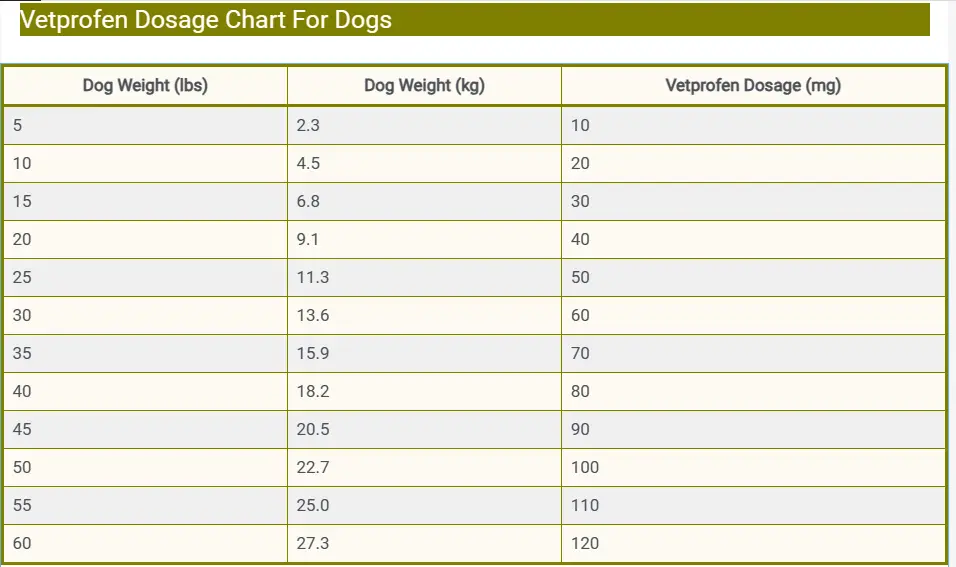The recommended dosage of Vetprofen for dogs, prescribed by veterinarians, is 4.4 mg/kg or 2 mg/lb of body weight per day. This dosage is typically administered to alleviate pain and inflammation related to osteoarthritis and manage postoperative pain following soft tissue and orthopedic surgeries in dogs.
Vetprofen Dosage For Dogs

-
Ideal Dosage: 4.4 mg/kg or 2 mg/lb
-
Uses: Alleviate pain and inflammation
-
FDA Approved: Yes
-
Variants: 25 mg, 75 mg, and 100 mg
-
Storage & Handling: Room Temperature
-
Dosage and Administration: Once Daily
If you’re a pet parent concerned about alleviating your dog’s pain and inflammation, especially related to conditions such as osteoarthritis or postoperative discomfort, you might be in search of medication to provide relief for your furry friend.
Vetprofen, also known as carprofen, is a nonsteroidal anti-inflammatory drug (NSAID) commonly prescribed for dogs to relieve pain and inflammation associated with conditions such as osteoarthritis or post-operative discomfort.
Vetprofen, commonly prescribed by veterinarians, offers effective relief. However, it’s crucial to understand the correct dosage to ensure your dog’s well-being.
Vetprofen Dosage For Dogs
The recommended dosage of Vetprofen for dogs is 2-4 mg per pound (4.4-8.8 mg/kg) of body weight, administered once daily or divided into two doses. However, dosing may vary depending on the specific condition being treated and the individual dog’s response to the medication.
It’s essential to consult your veterinarian before giving Vetprofen to your dog, as they will determine the appropriate dosage based on factors such as the dog’s weight, age, overall health, and any other medications they may be taking.
Your vet will monitor your dog for any adverse effects and adjust the dosage if necessary.
Only give Vetprofen to your dog with veterinary approval, and always follow their instructions carefully to ensure this medication’s safe and effective use.
Overdosing or improper use of NSAIDs like Vetprofen can lead to serious side effects, including gastrointestinal ulcers, kidney damage, and liver toxicity.
If you suspect your dog has ingested too much Vetprofen or is experiencing any adverse reactions, contact your veterinarian immediately.
Disclaimer: Self-medication can be hazardous. Please consult your veterinarian for personalized guidance on the appropriate dosage for your furry friend’s specific condition.
Vetprofen Dosage Chart For Dogs
| Dog Weight (lbs) | Dog Weight (kg) | Vetprofen Dosage (mg) |
|---|---|---|
| 5 | 2.3 | 10 |
| 10 | 4.5 | 20 |
| 15 | 6.8 | 30 |
| 20 | 9.1 | 40 |
| 25 | 11.3 | 50 |
| 30 | 13.6 | 60 |
| 35 | 15.9 | 70 |
| 40 | 18.2 | 80 |
| 45 | 20.5 | 90 |
| 50 | 22.7 | 100 |
| 55 | 25.0 | 110 |
| 60 | 27.3 | 120 |
Vetprofen 25 mg, 75 mg, and 100 mg For Dogs
| Dog Weight (lbs) | Dog Weight (kg) | Vetprofen 25 mg Dosage (tablet) | Vetprofen 75 mg Dosage (tablet) | Vetprofen 100 mg Dosage (tablet) |
|---|---|---|---|---|
| 5 | 2.3 | 1/2 Tablet | – | – |
| 10 | 4.5 | 1 Tablet | – | – |
| 15 | 6.8 | 1 Tablet | – | – |
| 20 | 9.1 | 1 Tablet | – | – |
| 25 | 11.3 | – | 1/3 Tablet | – |
| 30 | 13.6 | – | 1/2 Tablet | – |
| 35 | 15.9 | – | 1 Tablet | – |
| 40 | 18.2 | – | 1 Tablet | – |
| 45 | 20.5 | – | 1 Tablet | – |
| 50 | 22.7 | – | – | 1 Tablet |
| 55 | 25.0 | – | – | 1 Tablet |
| 60 | 27.3 | – | – | 1 Tablet |
Related Post: Thyro Tabs Dosage For Dogs
Uses
-
Osteoarthritis management
-
Postoperative pain relief
-
Musculoskeletal pain treatment
-
Chronic pain management for conditions like hip dysplasia
-
Alleviation of dental pain and inflammation
Potential Side Effects
-
Gastrointestinal upset (vomiting, diarrhea, or decreased appetite)
-
Ulceration or perforation of the stomach or intestines
-
Changes in liver enzymes
-
Kidney dysfunction or failure
-
Bleeding disorders
-
Allergic reactions (such as skin rash or itching)
-
Behavioral changes (lethargy, weakness, or restlessness)
-
Increased thirst and urination
Related Post: Vitamin B Complex Dosage For Dogs
Which Dog Should Not Take Vetprofen
-
Dogs with pre-existing gastrointestinal ulcers or bleeding disorders
-
Dogs with kidney or liver disease
-
Dogs receiving other NSAIDs or corticosteroids concurrently
-
Dogs with known hypersensitivity to carprofen or NSAIDs
-
Pregnant or nursing dogs
-
Dehydrated or hypovolemic dogs




![Can Dogs Eat Blood? 7 Side Effects [Expert Opinion]](https://petskor.com/wp-content/uploads/2022/04/Webp.net-resizeimage-12.jpg)
